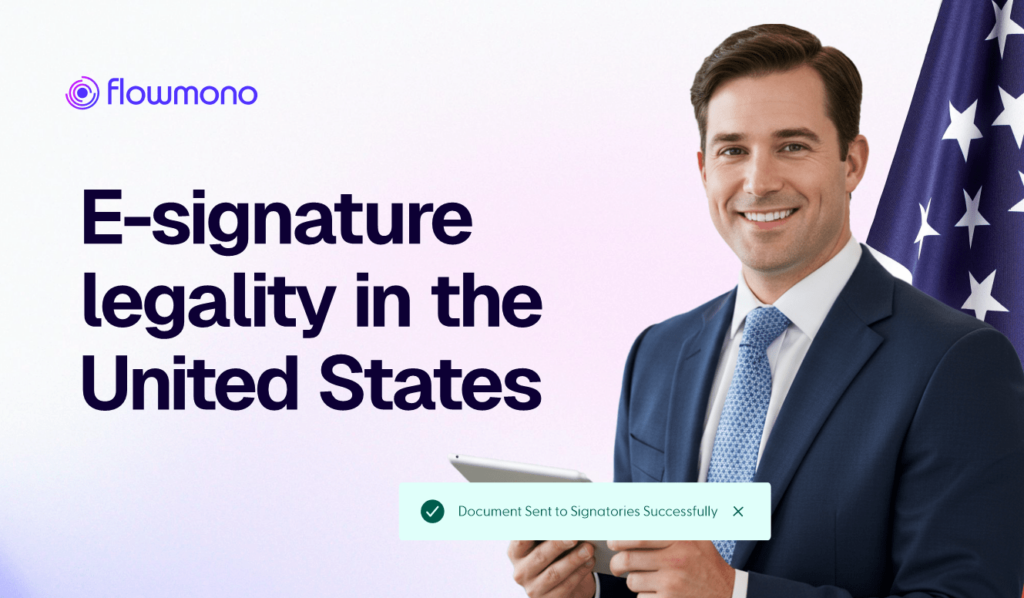
In the United States, electronic signatures are considered legally valid. This recognition is provided for in the Electronic Signatures in Global and National Commerce Act (ESIGN) and state and territory versions of the Uniform Electronic Transactions Act (UETA).
Additionally, an electronic signature is considered a digital signature if it meets the following requirements:
– It is unique to the signer.
– It is capable of verifying the signer.
– It is under the sole control of the signer.
– It is linked to the signed document in a way that any subsequent changes to the document can be detected.
Generally, UETA and E-SIGN provide that a signature may not be denied legal effect solely because it is in electronic form. When the parties to a business contract subject to one of these statutes agree to use an electronic signature, the electronic signature ordinarily will have legal effect. The agreement of the parties can be implicit and can be based on all the circumstances broadly construed. An opinion, therefore, that a business agreement has been duly executed can be based on the parties’ conduct. Under UETA, the exchange of electronically signed documents manifests the requisite agreement of the parties to use electronic signatures. Electronic signatures include signatures in emails, PDFs, and faxes and signatures provided by processes offered by commercial firms, [redacted] so long as they are affixed to or associated with the relevant agreement with an intent to sign by the persons providing them.
Under ESIGN, a “transaction” is an action or set of actions relating to the conduct of business, consumer, or commercial affairs between two or more persons, including any of the following types of conduct—(A) the sale, lease, exchange, licensing, or other disposition of (i) personal property, including goods and intangibles, (ii) services, and (iii) any combination thereof; and (B) the sale, lease, change, or other disposition of any interest in real property, or any combination thereof. A “person” is an individual, corporation, business trust, estate, trust, partnership, limited liability company, association, joint venture, governmental agency, public corporation, or any other legal or commercial entity.
Under UETA, a “transaction” is an action or set of actions occurring between two or more persons relating to the conduct of business, commercial, or governmental affairs. A “person” is an individual, corporation, business trust, estate, trust, partnership, limited liability company, association, joint venture, governmental agency, public corporation, or any other legal or commercial entity.
Notable Changes
None.
Types of Permitted Electronic Signature
ESIGN and UETA define an electronic signature as “any electronic sound, symbol, or process attached to or logically associated with a record and executed or adopted by a person with the intent to sign the record.
Documents That May be Signed Electronically
Electronic signatures may generally be used in the following categories of transactions or documents:
- ● Human Resources
- ● Procurement
- ● NDAs
- ● Software licensing
- ● Education
- ● Life Sciences
- ● Technology sector
- ● Consumer transactions (excluding certain post-default notices, and excluding non-uniform exemptions in California’s UETA)
While the use of electronic signatures is not prohibited for the following transaction types, caution should be exercised before using electronic signatures. Below are some examples of transaction categories that may require further assessment before proceeding:
- ● Corporate Resolutions
- ● Procurement
- ● Bills of Lading
- ● Healthcare
- ● Records related to FDA Clinical Trials
- ● Banking
- ● Wire Transfer Agreements
- ● Lending
- ● Real Estate
- ● Chattel Paper
- ● Insurance
- ● Documents to be Notarized
- ● Documents to be Recorded
- ● Government Filings
Documents That May Not Be Signed Electronically
ESIGN does not apply to the following transactions and/or documents:
- ● Wills or testamentary trusts
- ● Documents related to adoption, divorce, and other matters of family law
- ● Court documents requiring execution in connection with court proceedings
- ● Notice of utility termination, default or foreclosure under mortgage or lease, termination of health or life insurance, and product recalls and safety notices
- ● Notices that accompany transportation or handling of hazardous materials, pesticides, and other toxic materials
- ● Certificated securities
The UETA does not apply to the following transactions and/or documents:
- ● Wills and testamentary trusts
- ● We note that states are beginning to introduce and enact the Electronic Wills Act, meaning that despite the exemption from UETA, the ability to execute a will electronically is permissible in certain states.
- ● Certificated securities
- ● In some states:
- -Documents related to adoption, divorce, and other matters of family law
- -Court documents requiring execution in connection with court proceedings are excluded
- -Notice of utility termination, default or foreclosure under mortgage or lease, termination of health or life insurance, and product recalls and safety notices
- -Notices that accompany transportation or handling of hazardous materials, pesticides, and other toxic materials.
Disclaimer
The information on this site is for general information purposes only and is not intended to serve as legal advice. Laws governing the subject matter may change quickly, so Flowmono cannot guarantee that all the information on this site is current or correct. Should you have specific legal questions about any of the information on this site, consult a legal practitioner in your area.
![]()